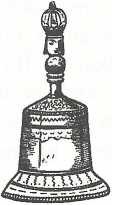By Swami Harshananda
Ghaṇṭā literally means ‘that which makes sound’.
Ghaṇṭā or bell is an indispensable part of ritualistic worship. No worship can be performed without sounding it first. It is said to embody all the musical instruments in itself. The sound of a bell is Praṇava or Oṅkāra which is perceptible to the ears. It is the usual practice to hang a bell or few bells in a temple in front of the main shrine and devotees are expected to ring them as they enter.
When the bell is sounded in pujā or worship it is an invitation for the gods to come and a warning for the evil spirits to depart immediately. The sound of the bell is said to rouse the power of the mantras used in worship. Hence, it is sometimes called as ‘mantramātā’ which means ‘mother of mantras’.
Significance Of Ghaṇṭā[edit]
- It is generally made of bronze.
- The body of the bell represents Ananta which means the divinity of time.
- The tongue represents Sarasvatī which is the goddess of speech.
- The handle signifies prāṇaśakti or the energy of prāṇa.
- Usually, the top of the handle is adorned by the idols of Hanumān or Garuḍa or a cakra (discus) or Nandi[1] or a triśula.[2]
Sounding of Ghaṇṭā[edit]
The bell is sounded during pujā and homa at various stages and includes:
- Āvāhana - inviting the deity
- Snāna - giving bath to the idol or the symbol
- Dhupa - waving of incense
- Dīpa - waving of a lighted lamp
- End of chanting of hymns
- Purṇāhuti - final offering
References[edit]
- The Concise Encyclopedia of Hinduism, Swami Harshananda, Ram Krishna Math, Bangalore

